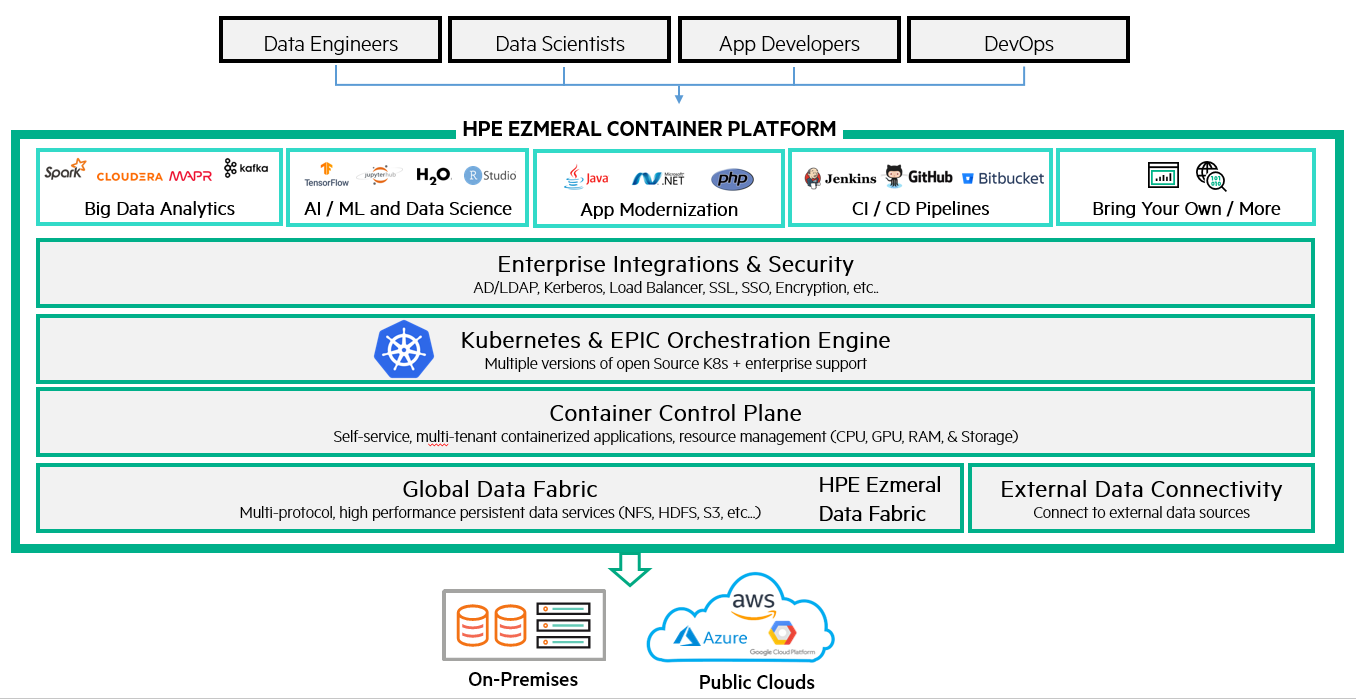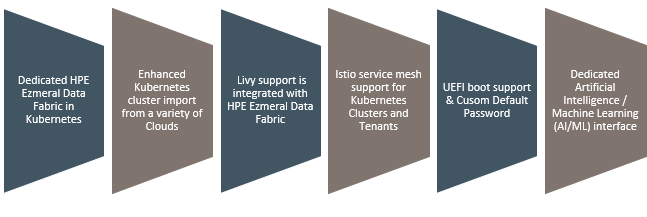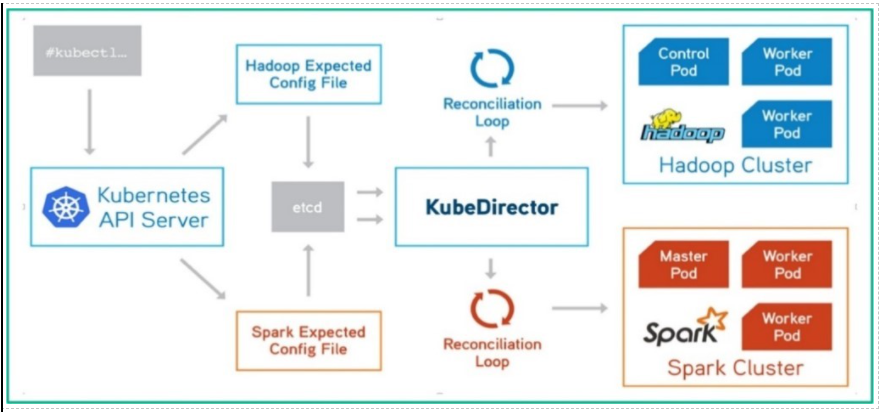# HPE Ezmeral Container Platform 5.2 Overview
The HPE Ezmeral Container Platform is a unified container platform built and designed for both cloud-native applications and stateful analytics applications running on any infrastructure either on-premises, in public clouds, in a hybrid model, or at the edge.
HPE Ezmeral Container Platform installs as a software layer between the underlying server infrastructure and the Big Data distribution, AI/ML libraries, and applications. The use of Docker is completely transparent and HPE Ezmeral Container Platform customers benefit from the greater agility and bare metal performance due to the lightweight nature of the containers. Customers can leverage the flexibility of the containers to simplify development for DevOps, CI/CD pipelines, and application modernization across hybrid cloud deployments.
The HPE Ezmeral portfolio allows you to:
Run containers and Kubernetes at scale to modernize apps, from edge to cloud
Manage your apps, data, and ops -- leveraging AI and analytics for faster time-to-insights
Ensure control for governance, compliance, and lower costs
Provide enterprise-grade security and authentication to reduce risk
Figure 1 shows the high-level HPE Ezmeral Container Platform architecture.

Figure 1. HPE Ezmeral Container Platform architecture
HPE Ezmeral Container Platform 5.2: What's new?

Figure 2. HPE Ezmeral Container Platform 5.2 What's New
AI/ML projects in Kubernetes: Version 4.0 introduced a dedicated artificial intelligence/machine learning (AI/ML) interface and workflow. Version 5.0 added support for Kubernetes pods, tenants, and clusters. Version 5.2 combines the two by adding the AI/ML workflow and interface to Kubernetes clusters. See about HPE Ezmeral ML Ops (opens new window) and Getting Started with AI/ML in Kubernetes (opens new window).
HPE Ezmeral Data Fabric in Kubernetes: The Data Fabric cluster can be created by adding new Data Fabric nodes. Subsequently the cluster can be registered to act as storage for a project or tenant for the entire HPE-ECP deployment. See about HPE Ezmeral Data Fabric (opens new window).
Istio: Kubernetes clusters and tenants may now include the Istio service mesh. See about Istio (opens new window).
Enhanced Kubernetes cluster import: HPE Ezmeral Container platform expands support for importing external Kubernetes clusters hosted on a variety of cloud platforms. See Importing an External Kubernetes Cluster (opens new window).
Custom default password: You may specify a custom default password when installing HPE Ezmeral Container Platform. See Standard Installation (opens new window).
UEFI boot support: You may now install HPE Ezmeral Container Platform on hosts with the UEFI boot feature enabled.
Livy support: Livy support is integrated with HPE Ezmeral Data Fabric, provided that HPE Ezmeral Container Platform is configured to use Kubernetes Data Fabric clusters during installation, and not the embedded version of HPE Ezmeral Data Fabric. See Platform Controller Setup. (opens new window)
# HPE Ezmeral Container Platform Controller
HPE Ezmeral Container Platform Controller is installed and configured on 3x HPE Synergy compute nodes. HPE Synergy D3940 Storage Module is used for ephemeral node storage. Platform-level high availability functionality is enabled to protect the HPE Ezmeral Container Platform against the failure of the Controller host. Platform-level high availability requires designated two EPIC worker hosts, such as Shadow Controller and Arbiter.
# Gateway load balancer
Gateway server provides a connection to HPE Ezmeral Container Platform managed Kubernetes cluster services. All public service end-points in KubeDirector managed Kubernetes clusters will be exposed via HPE Ezmeral Container Platform Gateway re-mapped ports. Redundancy for Gateway hosts is provided by creating two gateway servers by mapping multiple Gateway host IP addresses to a single hostname. This ensures that there is no single point of failure for the Gateway host. When this is done, then either the DNS server or an external load balancer will load-balance requests to the hostname among all the Gateway hosts on a round-robin basis. Hewlett Packard Enterprise has implemented gateway nodes on two (2) HPE Synergy 480 Gen10 Compute Modules.
# HPE Ezmeral Data Fabric for Kubernetes
The HPE Ezmeral Container Platform by default will install and configure the persistent data fabric for AI and analytics and K8s workload. This data fabric is a distributed file and object store that manages both structured and unstructured data. It is designed to store data at an Exabyte scale, support trillions of files, and combine analytics and operations into a single platform. It supports industry-standard protocols and APIs, including POSIX, NFS, S3, and HDFS. With production-ready capabilities like policy-based data tiering, consistent snapshots, and mirroring, the persistent data fabric serves as the enterprise standard for meeting stringent storage and processing SLAs across on-premises, hybrid cloud, and edge deployment.
All applications running in containers will be able to natively access data across the fabric through DataTaps as well as through FSMount. K8s persistent volumes will be seamlessly available across clusters from this persistent data fabric.
The data fabric provides pre-integrated, scale-out, and edge-ready persistent storage along with data services. The unique features provided by HPE Ezmeral Data Fabric are:
Enterprise data persistence with fast, flexible, and consistent data access for multiple tenants leveraging a global namespace and supports multi-protocol access.
Auto-tiering that enables an effortless data scale with seamless hot, warm, and cold data tiering across a hybrid cloud environment.
Secure and portable data access, controlled data, and app mobility from the core to cloud to edge using a common security and governance model.
Deployed clusters are viewed as a single, logical, and local cluster that is run globally.
Distributed metadata service and support of limitless scale (billions of files, PBs of data) with no single point of failure.
Ability to bring your AI/ML tool of choice without the need to create another copy/silo of data.
HA/Resiliency/DR capabilities for mission-critical deployment through automatic services failover, container re-replication, and mirroring.
Single distributed data fabric that can store files, tables, and message topics with data portability across nine (9) industry-standard APIs.
Multitenancy to support a range of application types on a single platform.
# KubeDirector
The HPE Ezmeral Container Platform uses standard Kubernetes (K8s) facilities of custom resources and API extensions to implement a stateful scale-out of application clusters. This approach enables transparent integration with K8s user or resource management and existing K8s clients and tools.
In broad terms, KubeDirector is a "custom controller" (deployed into K8s) that watches for custom resources of a given type to be created or modified within some K8s namespace(s). On such an event, KubeDirector uses K8s APIs to create or update the resources and configuration of a cluster to follow the specification defined in the custom resource.
Unlike some other custom controller implementations, KubeDirector does not tie a custom resource definition to an application or contain hardcoded application-specific logic within the controller. The application characteristics are instead defined by metadata and an associated package of configuration artifacts.
Figure 3 shows the diagram representation of the KubeDirector custom controller.
 Figure 3. KubeDirector custom controller
Figure 3. KubeDirector custom controller
# Kubernetes cluster
This consists of a bare metal Kubernetes cluster built on top of HPE Synergy 480 Gen10 Compute Modules and HPE Synergy D3940 Storage that can manage multiple versions of Kubernetes clusters with multitenant container isolation and data access for any workload from edge to core to cloud. The deployment of Kubernetes cluster is achieved using the proven HPE Ezmeral Container Platform software.